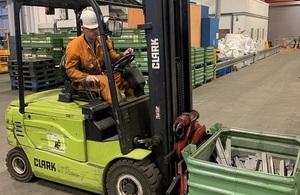LLWR and Sellafield contracts help Cyclife thrive
Workforce more than doubles and seven day working introduced.

Pieces of boxed metal being moved on a forklift
New contracts awarded by LLW Repository Ltd (LLWR) and Sellafield are playing their part in the continued success of Cyclife Metals Recycling Facility, based at Lillyhall, near Workington.
This has resulted in a doubling of the number of people employed at Cyclife from 26 in 2016 to 53 in two years due to increased demand for the recycling of low level metallic waste arising from decommissioning activities at Sellafield.
Since January 2019, the company has moved to permanent 7 day operation to keep up with the growing demand. The recycling of low level metallic waste has been a feature of the UK’s National Waste Programme delivered by LLWR for over 10 years and it is an important part of the NDA’s strategy to preserve the life of the Repository Site for the duration of the UK’s nuclear decommissioning programme.
Since 2017, the Remediation Department of Sellafield has been working closely with LLWR and Cyclife to make sure that its growing demands for processing and recycling metallic waste could be met.
Craig Broadbent, Head of Business Management at Cyclife, said: “As Sellafield is increasing its decommissioning activities, we have seen an increased demand for our services. We’re delighted to have been able to move to permanent 7 day operations at Lillyhall as a result. This has created over 25 new high quality jobs in the Workington area, and forms part of an important environmental service to the wider UK nuclear industry.”
Rob Way, Waste Systems Improvement Manager for Sellafield Ltd, said: “We’re pleased with the partnership that has developed with LLWR and Cyclife. By working with LLWR and Cyclife, we have gained a number of efficiencies through improved operational integration efficiencies as well as seeing a lowering of our costs via the supply chain.”
The Cyclife Metals Recycling Facility was opened in 2009 in response to capacity concerns at the LLW Repository. In 2016, the facility was purchased by EDF who also operate via EDF Energy the UK’s fleet of operating nuclear power stations. Cyclife has also recently added another 20 people in its consulting and projects businesses as the nuclear decommissioning sector continues to grow.
David Rossiter, Head of Waste Services at LLWR, added: “It has been nearly 10 years since LLWR started working with our customers and supply chain to preserve the life of the Repository Site by applying the waste management hierarchy.
“This year we passed a major landmark, diverting the equivalent of 10,000 containers (equivalent to one and a half disposal vaults) via alternative routes such as recycling, incineration, and VLLW disposal to landfill.
“Through LLWR’s metallic waste contract we have provided Sellafield with a solution that increases throughput, service reliability, and reduces costs. Winning this major contract has allowed Cyclife to invest in more capacity and create more highly skilled jobs in Cumbria, a major boost for the area, and supports the delivery of the Nuclear Decommissioning Authority’s (NDA) mission.”
Kevin Foley, Remediation Operations Manager for Sellafield Ltd, said: “Closer working with the supply chain is an important part of our approach to waste management. The flexible, pragmatic relationship we have with Cyclife is exactly what we need to ensure we can manage the waste we will produce as our mission changes and we focus on the clean up of the Sellafield site.
“I am pleased that this change has been so positive, and has enabled us deliver efficiencies on the Sellafield site, whilst ensuring our workforce can be deployed on priority work to manage our high hazard facilities.”
Over the next few years, Sellafield Ltd’s focus will change from reprocessing spent nuclear fuel, to the broad front decommissioning and clean up of the Sellafield site. This change will require flexible and varied waste management process and contractors, built on new and existing waste disposal routes and an increased use of technology to enhance waste categorisation and consignment.